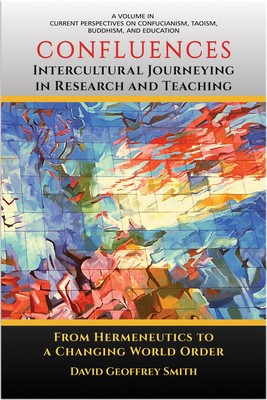
- We will send in 10–14 business days.
- Author: David Geoffrey Smith
- Publisher: Information Age Publishing
- ISBN-10: 1641138254
- ISBN-13: 9781641138253
- Format: 15.6 x 23.4 x 2.7 cm, kieti viršeliai
- Language: English
- SAVE -10% with code: EXTRA
CONFLUENCES Intercultural Journeying in Research and Teaching (e-book) (used book) | bookbook.eu
Reviews
Description
In this book, Canadian scholar David Geoffrey Smith reflects on over thirty years of research and teaching in the human sciences, including education. Written between 1986 and 2018, the essays are organized around four themes: Hermeneutics and the Human Sciences; The Poststructuralist Turn; Globalization and Its Discontents; East/West Encounters and the Search for Wisdom. As a historical guide through the defining discourses in the human sciences, this volume could well serve as an introductory text for graduate students in education and other cognate disciplines like nursing, recreation and cultural studies. The writing can be described as a form of meditative praxis, while the emphasis on interculturality addresses issues in literacy, pedagogy, politics, critical thinking, teacher education, and cultural healing from a geopolitical perspective, drawing on insights from both Western and Eastern traditions and the author's personal experience of being born in China and raised in Central Africa (Northern Rhodesia/Zambia).
EXTRA 10 % discount with code: EXTRA
The promotion ends in 23d.15:55:02
The discount code is valid when purchasing from 10 €. Discounts do not stack.
- Author: David Geoffrey Smith
- Publisher: Information Age Publishing
- ISBN-10: 1641138254
- ISBN-13: 9781641138253
- Format: 15.6 x 23.4 x 2.7 cm, kieti viršeliai
- Language: English English
In this book, Canadian scholar David Geoffrey Smith reflects on over thirty years of research and teaching in the human sciences, including education. Written between 1986 and 2018, the essays are organized around four themes: Hermeneutics and the Human Sciences; The Poststructuralist Turn; Globalization and Its Discontents; East/West Encounters and the Search for Wisdom. As a historical guide through the defining discourses in the human sciences, this volume could well serve as an introductory text for graduate students in education and other cognate disciplines like nursing, recreation and cultural studies. The writing can be described as a form of meditative praxis, while the emphasis on interculturality addresses issues in literacy, pedagogy, politics, critical thinking, teacher education, and cultural healing from a geopolitical perspective, drawing on insights from both Western and Eastern traditions and the author's personal experience of being born in China and raised in Central Africa (Northern Rhodesia/Zambia).


Reviews